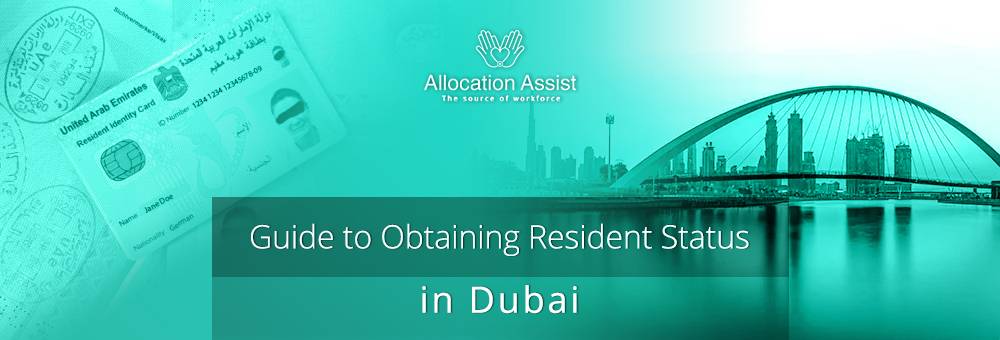
Have you secured a job offer in Dubai, or are you researching relocating to Dubai as a doctor or other healthcare professional? Applying for residency status and sponsoring your family if they are relocating with you can take some time. It helps doctors know in advance what is required and the Guide to Obtaining Resident Status in Dubai.
Read on to find out more about the process for obtaining:
- Medical Professional Licensing
- Residency Visa
- Emirates ID card
- Residency status for your spouse and children
Medical Professional Licensing
The first step, if you have not done so already, is to obtain your DHA (Dubai Health Authority) licence to work as a medical professional in Dubai. This takes, on average, 4 to 6 months, or longer in some cases. Therefore, serious candidates are encouraged to apply before securing an employment offer. More information can be found on the DHA website and in this DHA e-booklet.
As the licensing process is complex and exacting, Allocation Assist have an in-house dedicated and experienced licensing team. They can guide you on the precise documentation required, submit it, and monitor your application for a smooth and efficient licensing process.
DHA registration is valid for one year, however it is easy and straightforward to renew. The dataflow report, the longest part of the licensing process, can serve other UAE emirates or Gulf countries, and the verifications will never expire.
Obtaining your Residency Status
Once you have a signed employment contract, the next step is to obtain your residency status. You can only apply for your residency visa once you are in the country. Therefore, if you are relocating to the UAE, your new employer will obtain an Employment Entry Visa for you. This allows the holder to stay in the UAE for 30 days, with the option to extend it twice, while processing their residency visa.
Residency status allows you to work in the UAE, open a local bank account, apply for a driving licence and buy a car, obtain a tenancy agreement or purchase a property, sponsor residency for your spouse or dependents and register your children in government or private schools.
Most people stay in a hotel or serviced apartment until they obtain their residency visa. The process usually takes 1 or 2 months.
If you are already in the UAE on another type of visa, you will need to apply for a change of visa status after the entry visa is issued.
The application can be done on the Federal Authority for Identity and Citizenship website, but you will need to visit an authorized typing center with the Amer logo to submit your documents.
Documents Required for Residency Visa:
- Copy of passport (which is valid for at least six months)
- Employment Entry Visa
- Copy of attested professional qualification certificates
- Signed employment contract
- Salary certificate
- Health Insurance Card (usually provided by employer)
- Passport size photographs against a white background.
When applying for residency, applicants must undergo medical screening, which includes a blood test to check HIV status and a chest x-ray for tuberculosis screening.
According to the UAE labor law, visa expenses must be borne by the employer.
Translation and Attestation of documents
Many documents, like educational, professional, marriage, or birth certificates, require attestation to confirm the validity of seals and signatures, and they may also need translation into Arabic.
This can be done for a fee at government centers in the UAE. You may prefer to get documents attested in advance at a UAE embassy in your home country.
Applying for your Emirates ID Card
An Emirates ID smartcard is required for all citizens and residents to access many services from government institutions and regulated private companies.
Once you have applied for your residence visa, you should immediately apply for your Emirates ID card.
This can also be done on the Federal Authority for Identity and Citizenship website. You will need to visit an Emirates ID center, where your biometrics, such as photograph, signaturesand fingerprints, will be taken.
Your employers HR department will often follow up on your application. You will receive your residence visa stamped in your passport. Your Emirates ID will usually be available approximately 10 days after you receive your residency visa. A new e-Emirates ID, allows you to access services before the physical card is available.
Obtaining residency status for your spouse and children
If you are relocating to Dubai with your family, you will need to apply for their residency status, as their sponsor, after you receive your residency visa and Emirates ID.
If they are travelling with you, they can initially enter the country on a tourist visa (or visa on arrival) and then do a ‘change of status’ once their residency visa is approved. Alternatively, you may arrive first, complete the formalities and arrange accommodation for the family in advance.
The process for applying for their residency visa and Emirates ID is almost the same as above, with extra documents required.
Required documents for sponsoring spouse and children:
-
- Application form (online application or through a registered typing office)
- Passport copies of spouse and children
- Current visa copies of family members (if inside the UAE)
- Your original passport, residency visa and Emirates ID
- Passport size photographs of each family member
- Legalized, attested marriage certificate (translated into Arabic)
- Attested birth certificate of children (translated into Arabic)
- Medical clearance certificate (blood test and chest x-ray) for spouse and children above 18
- Copy of your employment contract
- Salary certificate from your employer
- Last 3 months bank statements
- Original registered tenancy contract
- Latest utility bill
(See earlier note on translation and attestation of documents)
You will need to pay the relevant fees to sponsor your family members. Depending on the nature of your contract, some employers may reimburse these expenses.
This UAE government website link contains more detailed information on sponsoring family residence. Also see (AMER 24/7)

Dubai is a fast-paced, highly competitive tourism & business hub and is not suited to everyone!
To find out more about working in this dynamic and growing healthcare sector, contact Allocation Assist



